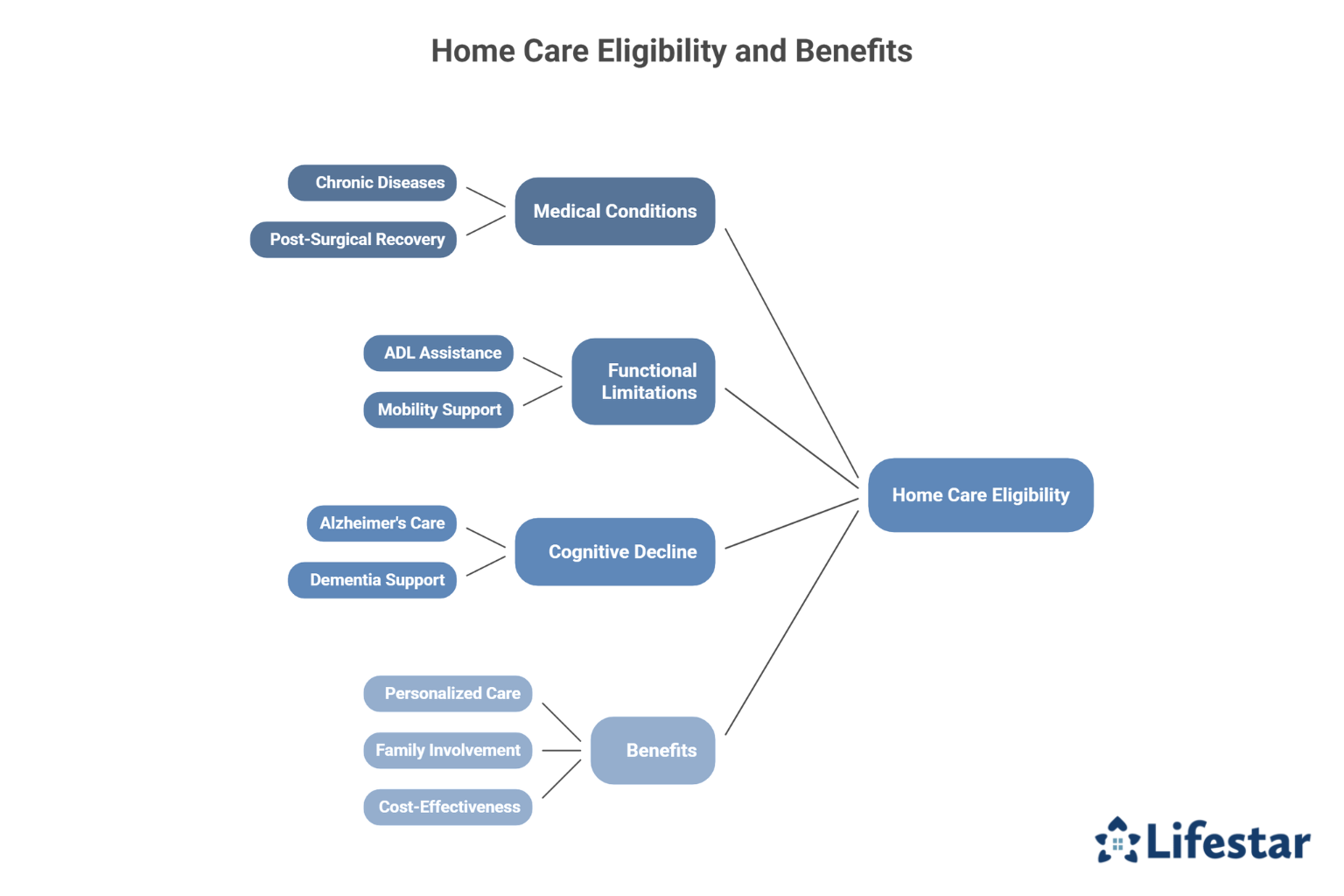
Table of Content
- 1 Understanding Eligibility for Home Care
- 2 Medical Conditions that Qualify a Patient for Home Care
- 3 Functional Limitations and Daily Living Needs
- 4 Benefits of Live-In Care for Long-Term Support
- 5 Memory and Cognitive Decline as a Qualifier
- 6 Who Decides if a Patient Qualifies?
- 7 Key Takeaways for Families Considering Home Care
- 8 Frequently Asked Questions
Patients qualify for home care if they need assistance at home due to illness, injury, disability, or age-related conditions. Doctors usually confirm eligibility when a person can safely remain at home but requires skilled services like nursing, therapy, or support with daily activities.
Understanding Eligibility for Home Care
Not every individual facing health challenges needs to move into a nursing facility. Many patients qualify for home care in Oklahoma City if they meet specific medical, functional, or personal care needs. Home care allows patients to stay in the comfort of their homes while receiving professional assistance tailored to their condition. This option not only supports independence but also ensures care is personalized and family-centered.

Medical Conditions that Qualify a Patient for Home Care
Certain health conditions make patients strong candidates for home care. Chronic diseases such as heart failure, diabetes, and COPD often require continuous monitoring. Post-operative patients may need wound care, IV therapy, or rehabilitation support. Seniors facing difficulties with memory, mobility, or nutrition also benefit from personalized care at home.
Here’s a simplified chart showing common qualifying conditions for home care:
| Condition | Type of Support Needed |
|---|---|
| Post-surgical recovery | Wound care, mobility support, therapy |
| Heart failure & chronic illness | Regular monitoring, medication management |
| Stroke or neurological disorders | Physical therapy, speech therapy, mobility aid |
| Memory-related conditions | Safety supervision, reminders, daily care |
| Limited mobility | Assistance with transfers, bathing, dressing |
Functional Limitations and Daily Living Needs
Even without serious medical issues, patients may qualify for home care if they face difficulty with activities of daily living (ADLs). These include bathing, eating, toileting, dressing, and mobility. Professional caregivers ensure patients maintain hygiene, nutrition, and safety within their home environment.
For example, a senior who cannot climb stairs safely or someone recovering from hip surgery who cannot cook independently is often eligible for home assistance. Families who want their loved ones to avoid institutional care find this support both practical and emotionally reassuring. The right care plan balances independence with much-needed supervision.
Benefits of Live-In Care for Long-Term Support
When daily support isn’t enough, families often turn to live-in care for consistent supervision. Some key benefits include:
- 24/7 support – A trained caregiver is always present to help with medication reminders, mobility, and emergencies.
- Safety for vulnerable patients – This is especially useful for individuals with progressive conditions or those prone to falls.
- Peace of mind – Families know their loved one is never alone and always supervised.
- Continuity of care – This builds stronger caregiver-patient relationships compared to rotating or part-time caregivers.
- Emotional wellbeing – Caregivers provide companionship and reduce feelings of isolation or anxiety.
- Cost-effective alternative – Live-in care is often more affordable than long-term nursing facilities.
Memory and Cognitive Decline as a Qualifier
Patients with Alzheimer’s disease or dementia often qualify for specialized care. Families may consider Alzheimer’s care for loved ones who require constant supervision, redirection, and structured routines. Memory care at home creates a safer environment while maintaining familiarity, which is critical for patients with cognitive challenges.
Professional caregivers trained in dementia care provide assistance with medication reminders, safety checks, and engaging activities that stimulate the mind. Home-based Alzheimer’s care reduces the stress that can come from institutional transitions and allows families to remain closely involved in their loved one’s daily life.
Who Decides if a Patient Qualifies?
A physician or healthcare professional typically assesses whether home care is appropriate. The doctor evaluates the senior’s medical history, current needs, and safety factors within the home. Insurance requirements may also influence eligibility, particularly if skilled nursing or therapy is prescribed.
Assessment tools often include checklists that measure mobility, cognitive ability, and the ability to perform ADLs. In many cases, a home care agency will conduct an in-home evaluation to recommend a personalized care plan. This ensures patients receive the right balance of medical and supportive care without unnecessary hospitalization.
Key Takeaways for Families Considering Home Care
- Patients qualify based on medical conditions, daily living needs, and physician recommendations.
- Chronic illness, post-surgical recovery, memory issues, and mobility challenges are strong indicators.
- Live-in care and Alzheimer’s care provide specialized support for long-term or memory-related conditions.
- Families benefit from reduced hospital stays, personalized assistance, and better emotional wellbeing.
Frequently Asked Questions
What are the basic requirements for home care services?
+
A patient must need help with medical or daily living activities, and a physician usually certifies the necessity of care.
Can home care replace hospitalization?+
Not entirely. Home care supports recovery and management of conditions but is not a substitute for emergency hospital care.
Does Medicare cover home care services?+
Yes, but only when skilled nursing or therapy is required and a doctor certifies the need for such car
How do families know if live-in care is necessary?+
If a patient requires constant supervision, assistance with medications, or has safety risks, live-in care is often recommended.
Is Alzheimer’s care available at home?+
Yes, trained caregivers provide memory care services at home to ensure safety, structure, and emotional comfort for patients.